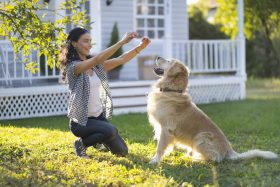Understanding & Dealing With Possessive Aggression in Dogs

Dogs can bite for a wide range of reasons. Even a dog that’s typically happy and friendly might bite if they feel fearful or nervous about a situation or if someone is bothering them when they don’t feel well. Dogs who are taking care of puppies can also attack if they feel like someone or something is a threat to the puppies. But another very common cause of dog bites is possessive aggression.
What is Possessive Aggression?
Dogs can be very protective of things that belong to them. Very often, this involves food, treats, toys, and locations like beds, but it may also include people the dog feels particularly attached to or even random objects around the house, like some of your clothing or a child’s toy. If a dog feels like any of those special things are in danger of being taken away from them, they might react by growling, snapping, or biting. This is known as possessive aggression, also often called resource guarding. It’s important to note that sometimes, possessive aggression can show in more mild ways, such as refusing to give up a toy when you tell them to.
Possessive aggression is very common since dogs have a natural instinct to protect things that are necessary for their survival. Dogs who have spent long amounts of time in animal shelters in particular may be prone to resource guarding. It’s also possible for a dog to not show any signs of possessive aggression when living alone, but later develop those tendencies after another pet is introduced to the household.
Even though possessive aggression is common, that doesn’t mean it’s acceptable. When dogs are living in households where there are plenty of resources to go around, this type of behavior needs to be dealt with to prevent the dogs from lashing out at people or other animals in ways that could cause injuries.
How to Handle Possessive Aggression
The sooner you’re able to start teaching a dog to avoid possessive aggression, the better. But even if you’ve adopted an adult dog, it is still possible to help them stop this behavior.
Sometimes, owners of dogs try to deal with possessive aggression by taking the guarded item away from the dog, thinking it will show the dog who’s boss. But many dog training experts discourage this since it can make it more likely the dog will react by lashing out and will reinforce the idea that someone else touching these things will result in them being completely taken away. Instead, it’s a better idea to help them learn that good things can come from having their guarded objects touched.
For example, if a dog is possessive of their food bowl, calmly approaching them while they eat and dropping a treat into their bowl can help them learn that people may come up to their food bowl for good reasons. Hand-feeding a puppy can also help. Or if a dog is protective of a special toy, training them to understand the “drop it” or “leave it” command and following it by giving them a reward like a treat or a different toy will help them learn the right message.
In some cases, it might be best to limit a dog’s access to things they’re protective of. For instance, if a dog shows signs of possessive aggression while laying on a couch, you could use a baby gate to keep the dog away from the couch. Or if a dog starts acting aggressive when someone comes to the door, it’s best to put them in a separate room while the visitor is around. If a dog is aggressive about their toys, the toys should be stored out of reach and only given to the dog while confined in a certain room or in their crate, separate from others. That way, they can learn to relax while enjoying their toys since they won’t be interrupted by other pets or young children wanting to play.
If you’ve tried dealing with possessive aggression, but the dog seems to have a hard time getting the message, it’s a good idea to contact a local dog trainer to see if they can help.
Contact a Michigan Dog Bite Lawyer
Dog attacks can have some very long-lasting effects, both physical and psychologically. If you’ve been injured by a dog attack, it’s very important to contact a dog bite lawyer as soon as possible. Talking to a lawyer will give you a chance to get answers to any questions you have about your situation and to learn more about your legal options. At Goodwin & Scieszka, you’ll be able to get help from a lawyer highly experienced in handling Michigan dog bite cases. Contact us today to find out how we can help.
Image: iStock / Vladimir Vladimirov






